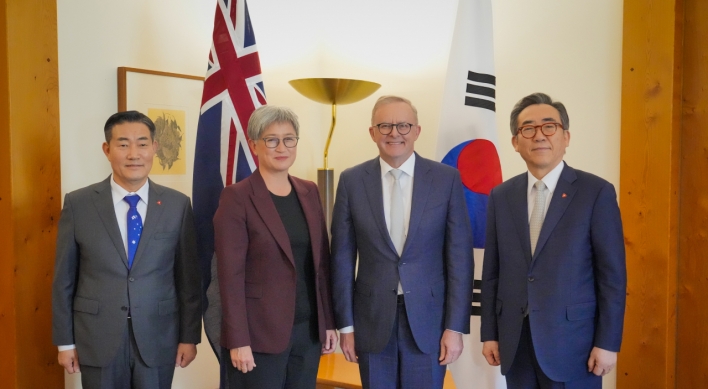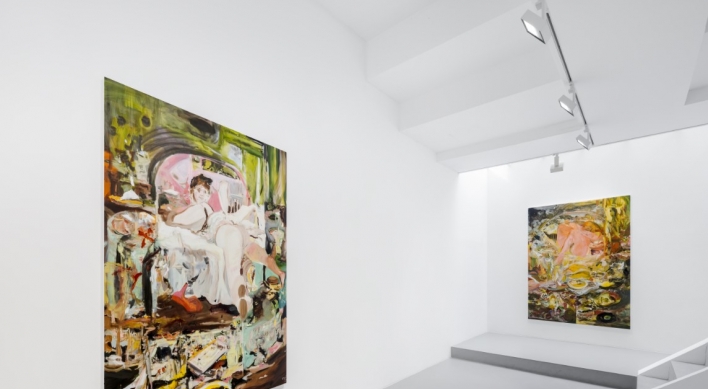Judges, as public officeholders, are constitutionally required to remain politically neutral. They are not allowed to take sides. The ethics committee of the Supreme Court drove this point home when it called on judges to exercise prudence on the use of the social networking services on Tuesday.
The committee’s call for caution followed a political comment that a judge recently posted on Facebook. But the committee chose not to take any disciplinary action against the judge when it was called into session to deliberate on his criticism of the Korean-U.S. free trade agreement, simply because there were no explicit regulations on the use of the SNS by judges.
On Facebook last week, a senior judge of the Incheon district court wrote that President Lee Myung-bak “sold the nation off to the United States” by concluding the free trade agreement. He accused Lee of being “pro-American to the bone.” This unrestrained, unrefined remark, which could hardly become of a senior judge, triggered a heated dispute between conservative and progressive groups of people.
At issue was whether the SNS was a public domain where public officeholders were required to remain politically neutral or a private one where they could freely express their personal political views. The ethics committee apparently believed the SNS was more of a public domain when it called on judges to be “discretionary and cautious in the use of social network services.”
Judges are not just required to maintain neutrality in court proceedings, but also to leave no room for suspicion about judicial neutrality, if they are to convince the public that justice is administered. As such, great caution is demanded of them in their conduct, even in a private setting.
The dispute over the judge’s remark on Facebook is a case in which the constitutional clause on political neutrality required of public officeholders is allegedly in conflict with that on freedom of speech.
Those in defense of the remark on Facebook insist that it was an issue concerning freedom of speech and that the judge, endowed with the basic rights like everyone else, was free to post his political opinion on social networking sites. In making this claim, however, they are deliberately ignoring the judge’s failure to maintain political neutrality as a public officeholder by posting the remark, to which the public had access.
By posting the comment on Facebook, the judge showed that he was politically inclined and thus liable to take sides. In other words, his ill-conceived action deprived him of the appearance of impartiality and possibly impartiality itself, which any judge needs to have in adjudicating cases rife with partisan and political implications.
It was not the judge’s misconduct alone that was subject to public censure. Some of his defenders, progressive in their political orientation, could not be excused for their biased behavior. A case in point involved another judge who posted an ill-advised comment on the judiciary’s intranet. He made an unveiled threat of collective action against the Supreme Court when he said he and other like-minded judges would not sit idly by if it disciplined the judge from the Incheon district court in any way “for reasons that were beyond comprehension.”
It should be all but impossible for the public to demand judges maintain unwavering neutrality. Most of them are inclined toward either conservatism or liberalism, though to different degrees.
Yet, it is their duty as public officeholders to exercise self-restraint in expressing their opinion, maintain decorum befitting their status and try to maintain utmost political neutrality. Otherwise, they cannot be held in the necessary high esteem by the public or their peers.
For its part, the Supreme Court will have to hasten to come up with regulations on the use of the SNS by judges. It goes without saying it would have to sponsor debates among legal, new media and other experts and conduct research abroad before starting to write its own SNS rules.
The committee’s call for caution followed a political comment that a judge recently posted on Facebook. But the committee chose not to take any disciplinary action against the judge when it was called into session to deliberate on his criticism of the Korean-U.S. free trade agreement, simply because there were no explicit regulations on the use of the SNS by judges.
On Facebook last week, a senior judge of the Incheon district court wrote that President Lee Myung-bak “sold the nation off to the United States” by concluding the free trade agreement. He accused Lee of being “pro-American to the bone.” This unrestrained, unrefined remark, which could hardly become of a senior judge, triggered a heated dispute between conservative and progressive groups of people.
At issue was whether the SNS was a public domain where public officeholders were required to remain politically neutral or a private one where they could freely express their personal political views. The ethics committee apparently believed the SNS was more of a public domain when it called on judges to be “discretionary and cautious in the use of social network services.”
Judges are not just required to maintain neutrality in court proceedings, but also to leave no room for suspicion about judicial neutrality, if they are to convince the public that justice is administered. As such, great caution is demanded of them in their conduct, even in a private setting.
The dispute over the judge’s remark on Facebook is a case in which the constitutional clause on political neutrality required of public officeholders is allegedly in conflict with that on freedom of speech.
Those in defense of the remark on Facebook insist that it was an issue concerning freedom of speech and that the judge, endowed with the basic rights like everyone else, was free to post his political opinion on social networking sites. In making this claim, however, they are deliberately ignoring the judge’s failure to maintain political neutrality as a public officeholder by posting the remark, to which the public had access.
By posting the comment on Facebook, the judge showed that he was politically inclined and thus liable to take sides. In other words, his ill-conceived action deprived him of the appearance of impartiality and possibly impartiality itself, which any judge needs to have in adjudicating cases rife with partisan and political implications.
It was not the judge’s misconduct alone that was subject to public censure. Some of his defenders, progressive in their political orientation, could not be excused for their biased behavior. A case in point involved another judge who posted an ill-advised comment on the judiciary’s intranet. He made an unveiled threat of collective action against the Supreme Court when he said he and other like-minded judges would not sit idly by if it disciplined the judge from the Incheon district court in any way “for reasons that were beyond comprehension.”
It should be all but impossible for the public to demand judges maintain unwavering neutrality. Most of them are inclined toward either conservatism or liberalism, though to different degrees.
Yet, it is their duty as public officeholders to exercise self-restraint in expressing their opinion, maintain decorum befitting their status and try to maintain utmost political neutrality. Otherwise, they cannot be held in the necessary high esteem by the public or their peers.
For its part, the Supreme Court will have to hasten to come up with regulations on the use of the SNS by judges. It goes without saying it would have to sponsor debates among legal, new media and other experts and conduct research abroad before starting to write its own SNS rules.
-
Articles by Korea Herald






![[Herald Interview] Mom’s Touch seeks to replicate success in Japan](http://res.heraldm.com/phpwas/restmb_idxmake.php?idx=644&simg=/content/image/2024/04/29/20240429050568_0.jpg&u=)



![[News Focus] Lee tells Yoon that he has governed without political dialogue](http://res.heraldm.com/phpwas/restmb_idxmake.php?idx=644&simg=/content/image/2024/04/29/20240429050696_0.jpg&u=20240429210658)








![[Today’s K-pop] Seventeen sets sales record with best-of album](http://res.heraldm.com/phpwas/restmb_idxmake.php?idx=642&simg=/content/image/2024/04/30/20240430050818_0.jpg&u=)